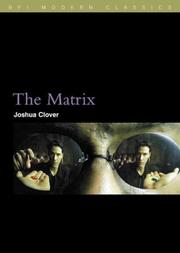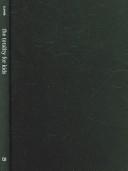| Listing 1 - 10 of 15 | << page >> |
Sort by
|

ISBN: 1844570452 Year: 2004 Publisher: London : BFI Publishing,
Abstract | Keywords | Export | Availability | Bookmark
 Loading...
Loading...Choose an application
- Reference Manager
- EndNote
- RefWorks (Direct export to RefWorks)
Motion pictures --- Cinéma --- History --- Histoire --- Wachowski, Andy, --- Wachowski, Larry, --- Matrix (Motion picture) --- Joshua Clover --- film --- filmgeschiedenis --- sciencefiction --- speciale effecten --- twintigste eeuw --- Verenigde Staten --- Wachowski Andy --- Wachowski Larry --- 791.471 WACHOWSKI --- Cinéma --- Wachowski, Lilly, --- Wachowski, Lana,
Book
ISBN: 1282772635 9786612772634 052094464X 9780520944640 9781282772632 9780520267879 0520267877 9780520252554 0520252551 Year: 2009 Publisher: Berkeley : University of California Press,
Abstract | Keywords | Export | Availability | Bookmark
 Loading...
Loading...Choose an application
- Reference Manager
- EndNote
- RefWorks (Direct export to RefWorks)
In a tour de force of lyrical theory, Joshua Clover boldly reimagines how we understand both pop music and its social context in a vibrant exploration of a year famously described as "the end of history." Amid the historic overturnings of 1989, including the fall of the Berlin Wall, pop music also experienced striking changes. Vividly conjuring cultural sensations and events, Clover tracks the emergence of seemingly disconnected phenomena--from grunge to acid house to gangsta rap--asking if "perhaps pop had been biding its time until 1989 came along to make sense of its sensibility." His analysis deftly moves among varied artists and genres including Public Enemy, N.W.A., Dr. Dre, De La Soul, The KLF, Nine Inch Nails, Nirvana, U2, Jesus Jones, the Scorpions, George Michael, Madonna, Roxette, and others. This elegantly written work, deliberately mirroring history as dialectical and ongoing, summons forth a new understanding of how "history had come out to meet pop as something more than a fairytale, or something less. A truth, a way of being."
Popular music --- Rap (Music) --- Underground dance music --- Grunge music --- Nineteen eighty-nine, A.D. --- 1989 A.D. --- Nineteen hundred eighty-nine, A.D. --- Year nineteen eighty-nine, A.D. --- Nineteen eighties --- Grunge rock music --- Alternative rock music --- Club music --- Dance music, Electronic --- Dance music, Underground --- EDM (Electronic dance music) --- Electronic music (Electronic dance music) --- UDM (Underground dance music) --- Dance music --- Electronica (Music) --- Remixes --- Music, Popular --- Music, Popular (Songs, etc.) --- Pop music --- Popular songs --- Popular vocal music --- Songs, Popular --- Vocal music, Popular --- Music --- Cover versions --- History and criticism. --- acid house. --- bands. --- cultural studies. --- de la soul. --- dr dre. --- entertainment industry. --- fall of the berlin wall. --- gangsta rap. --- george micheal. --- grunge music. --- historical. --- history. --- jesus jones. --- lyrical theory. --- madonna. --- media studies. --- music studies. --- music. --- musicians. --- nine inch nails. --- nirvana. --- nwa. --- performing arts. --- political aesthetics. --- politics. --- pop music. --- popular music. --- public enemy. --- rap music. --- retrospective. --- roxette. --- singers. --- social context. --- the end of history. --- the klf. --- the scorpions. --- u2. --- Electronic dance music

ISBN: 1282771973 9786612771972 0520939093 9780520939097 0520245997 0520246004 9780520245990 9781282771970 6612771976 9780520246003 Year: 2006 Publisher: Berkeley : University of California Press,
Abstract | Keywords | Export | Availability | Bookmark
 Loading...
Loading...Choose an application
- Reference Manager
- EndNote
- RefWorks (Direct export to RefWorks)
The Totality for Kids is the second collection of poems by Joshua Clover, whose debut, Madonna anno domini, won the Walt Whitman award from the Academy of American Poets. This volume takes as its subject the troubled sleep of late modernity, from the grandeur and failure of megacities to the retreats and displacements of the suburbs. The power of crowds and architecture commingles with the alienation and idleness of the observer, caught between "the brutal red dream/Of the collective" and "the parade/Of the ideal citizen." The book's action takes place in these gaps, "dead spaces beside the endlessly grieving stream." The frozen tableau of the spectacle meets its double in the sense that something is always about to happen. Political furies and erotic imaginings coalesce and escape within a welter of unmoored allusions, encounters, citations, and histories, the dreams possible within the modern's excess of signification-as if to return revolutionary possibility to the regime of information by singing it its own song.
American poetry. --- American literature --- 20th century. --- alienation. --- allusions. --- america. --- american literature. --- american poetry. --- american poets. --- architecture. --- art and literature. --- aspiring poets. --- award winner. --- contemporary poetry. --- contemporary poets. --- english majors. --- eroticism. --- lit students. --- literary critics. --- literary studies. --- modern histories. --- modern perspective. --- modern poets. --- modernity. --- observations. --- poems. --- poetry collection. --- poetry. --- political poems. --- sleep issues. --- suburban landscape. --- suburbs. --- troubled sleep.
Book
ISBN: 1784780596 9781784780593 Year: 2016 Publisher: London: Verso,
Abstract | Keywords | Export | Availability | Bookmark
 Loading...
Loading...Choose an application
- Reference Manager
- EndNote
- RefWorks (Direct export to RefWorks)
"Ferguson. Tottenham. Clichy-Sous-Bois. Oakland. Within capital's core, the riot looms increasingly large within the repertoire of struggles. Rather than inchoate spasms or immiserated absence of the revolutionary idea, this book locates the riot within longue duree of capitalist transformation: facts not failures. Just as the turn to the strike two centuries ago signaled recompositions of class and society, the return of the riot testifies to current possibilities of anticapitalist struggle, featuring radicalized struggle beyond the labor market. Following the post-1600 course "riot-strike-riot," the book departs from lapsed models of party and revolution, showing how shifting global strategies to restore profitability since the 1970s must inevitably open onto "circulation struggles" which pass through riot, and whose horizon is the commune"--
Riots --- Strikes and lockouts --- Communal living

ISBN: 9781844570454 Year: 2008 Publisher: London BFI
Abstract | Keywords | Export | Availability | Bookmark
 Loading...
Loading...Choose an application
- Reference Manager
- EndNote
- RefWorks (Direct export to RefWorks)
Book
ISBN: 9781839022678 Year: 2021 Publisher: London Bloomsbury on behalf of the British Film Institute
Abstract | Keywords | Export | Availability | Bookmark
 Loading...
Loading...Choose an application
- Reference Manager
- EndNote
- RefWorks (Direct export to RefWorks)
The Matrix (1999), directed by the Wachowski sisters and produced by Joel Silver, was a true end-of-the-millennium movie, a statement of the American zeitgeist, and, as the original film in a blockbusting franchise, a prognosis for the future of big-budget Hollywood film-making. Starring Keanu Reeves as Neo, a computer programmer transformed into a messianic freedom fighter, The Matrix blends science fiction with conspiracy thriller conventions and outlandish martial arts created with groundbreaking digital techniques. A box-office triumph, the film was no populist confection: its blatant allusions to highbrow contemporary philosophy added to its appeal as a mystery to be decoded. In this compelling study, Joshua Clover undertakes the task of decoding the film. Examining The Matrix's digital effects and how they were achieved, he shows how the film represents a melding of cinema and video games (the greatest commercial threat to have faced Hollywood since the advent of television) and achieves a hybrid kind of immersive entertainment. He also unpacks the movie's references to philosophy, showing how The Matrix ultimately expresses the crisis American culture faced at the end of the 1990s (Provided by publisher)
Book
ISBN: 1478013478 1478014393 1478021691 Year: 2021 Publisher: Duke University Press
Abstract | Keywords | Export | Availability | Bookmark
 Loading...
Loading...Choose an application
- Reference Manager
- EndNote
- RefWorks (Direct export to RefWorks)
Book
ISBN: 9782940426423 Year: 2018 Publisher: Genève ; Paris : Entremonde,
Abstract | Keywords | Export | Availability | Bookmark
 Loading...
Loading...Choose an application
- Reference Manager
- EndNote
- RefWorks (Direct export to RefWorks)
L’émeute est généralement négligée par les marxistes, taxée d’apolitisme et renvoyée à l’instant pur, à la spontanéité. Joshua Clover s’attache à la théoriser et à comprendre la succession des formes de contestation dans la longue durée. Quand le capitalisme apparaît, l’émeute est la forme de lutte dominante, s’attaquant à la circulation des marchandises. Puis, au moment de la révolution industrielle et jusqu’à l’immédiate après-guerre, la grève lui succède, avec cette fois la sphère de la production en ligne de mire. Depuis les années 1960 à 1970, une période marquée par la désindustrialisation, le chômage de masse et le ralentissement de l’accumulation en Occident, l’émeute redevient la forme de contestation par excellence ; cette émeute nouvelle, c’est l’émeute prime
Émeutes. --- Grèves et lock-out. --- Mouvements sociaux. --- Mouvements contestataires. --- Capitalisme. --- Riots. --- Strikes and lockouts. --- Social movements. --- Protest movements. --- Capitalism. --- Mouvements sociaux --- Émeutes --- Grèves et lock-out --- Capitalisme --- Mouvements contestataires
Film
ISBN: 078002589X Year: 2003 Publisher: S.l. The Criterion Collection.
Abstract | Keywords | Export | Availability | Bookmark
 Loading...
Loading...Choose an application
- Reference Manager
- EndNote
- RefWorks (Direct export to RefWorks)
film uit 1964
Book

ISBN: 9780823298228 Year: 2022 Publisher: New York Fordham University Press
Abstract | Keywords | Export | Availability | Bookmark
 Loading...
Loading...Choose an application
- Reference Manager
- EndNote
- RefWorks (Direct export to RefWorks)
No detailed description available for "Totality Inside Out".
| Listing 1 - 10 of 15 | << page >> |
Sort by
|

 Search
Search Feedback
Feedback About UniCat
About UniCat  Help
Help News
News